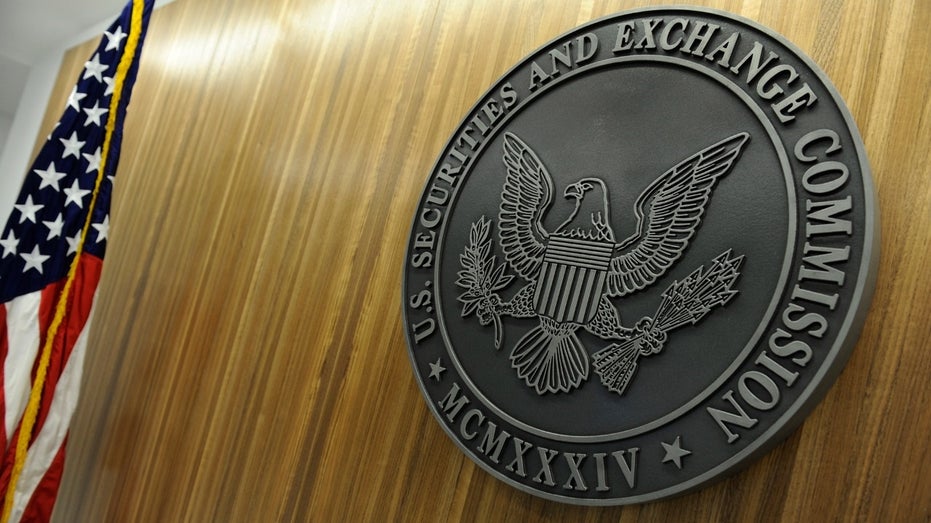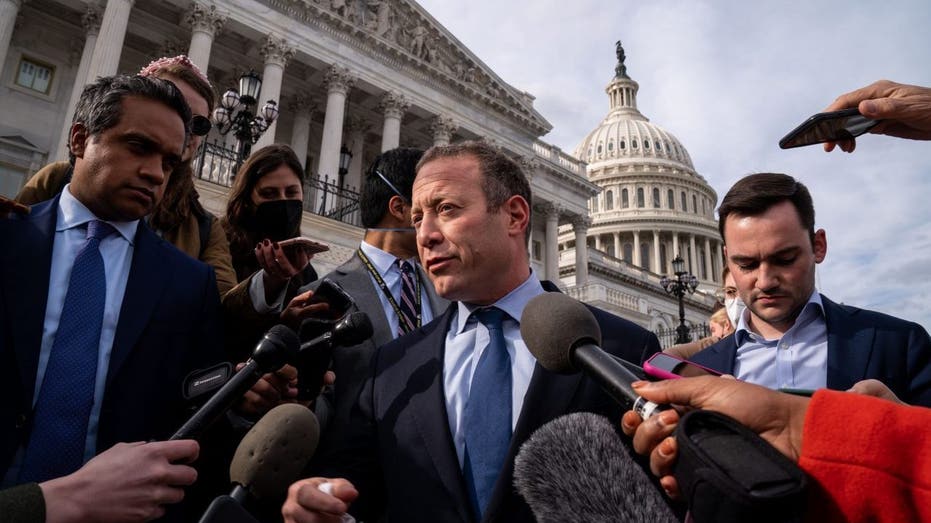Ben & Jerry's corporate owner eyed by Israeli government, members of Congress
Ben & Jerry’s will remain in Israel until after the end of 2022, pending its new arrangement with Israel
Fox Business Flash top headlines for February 11
Check out what's clicking on FoxBusiness.com.
While ice cream is far from the most serious U.S. concern in the Middle East, a recent development in the Ben & Jerry’s saga in Israel could drive the push for a Securities and Exchange Commission investigation that members of Congress from both parties have sought.
Israel’s Justice Minister Gideon Sa’ar announced the government will consider possible action against Unilever, the owner of Ben & Jerry’s, under the country’s anti-boycott law. Although Ben & Jerry’s announced last July it would stop selling ice cream in "occupied" territory, a law might require it – and possibly Unilever Global – to pull out of the country.
| Ticker | Security | Last | Change | Change % |
|---|---|---|---|---|
| UL | UNILEVER PLC | 71.36 | -0.76 | -1.05% |
For its part, Unilever, a sprawling corporation with other major brands that include Axe, Dove, Hellman’s and Vaseline, contends "boycott" is a mischaracterization, and said that Ben & Jerry’s will remain in Israel until after the end of 2022.
"Our absolute focus right now is to figure out what the new arrangement will be for Ben & Jerry’s," Unilever CEO Alan Jope said Thursday during a conference call with reporters.

Gideon Sa'ar, Israeli Member of Knesset for Likud, speaks during a rally as he launches his campaign for Likud party leadership in Or Yehuda, near Tel Aviv, Dec. 16, 2019. (Jack Guez/AFP via Getty Images / Getty Images)
SHORTAGE OF DISPOSABLE COFFEE CUPS STIRS AN AMERICAN ENERGY CRISIS
In December, Republican senators John Kennedy of Louisiana, Tim Scott of South Carolina and Thom Tillis of North Carolina – all members of the Senate Banking Committee – signed a letter to SEC Chairman Gary Gensler inquiring if the ice cream seller pulled out of the entire country or, as Ben & Jerry's asserted, only planned to exit the West Bank and Gaza Strip to take a stance on the Israeli-Palestinian conflict. FOX Business was the first to report on the matter.
Sa’ar, the justice minister, will be working with Israeli Finance Minister Avigdor Liberman. Any actions against the company must be approved by the Knesset’s Law and Constitution Committee, the Jerusalem Post reported. The Knesset passed the boycott law in 2011 to impose sanctions on a boycotting company or organization.
"The State of Israel must fight against attempts to boycott us, which are part of a larger strategy of delegitimizing the Jewish state," Sa’ar said, according to the Post.
Interestingly, it was the Ben & Jerry’s Israel CEO Avi Zinger who asked the government to retaliate against Unilever, asserting the company was still selling millions of dollars worth of goods in the country, while Ben & Jerry’s was being harmed.
The Israeli law, meant to respond to the "Boycott, Divestment, Sanctions movement," also known as BDS, prohibits companies from engaging in targeted boycotts.
"Effectively, that means Ben & Jerry’s can stay and sell in all of Israel, including the OPT [Occupied Palestinian Territory] referenced in the firm’s July 19 statement, or it can leave Israel entirely," the GOP senators said in the letter to the SEC. "But it cannot remain in the country in the way it publicly said it would: partially-in, partially-out."

Ben and Jerry's ice cream (Ben and Jerry's)
HOW TO GET FREE FOOD BEFORE, DURING AND AFTER THE SUPER BOWL
A Ben & Jerry’s spokesperson declined to comment on the new development but referred to the original July 19 statement on its website.
"We believe it is inconsistent with our values for Ben & Jerry’s ice cream to be sold in the Occupied Palestinian Territory (OPT)," the statement says. But it goes on to add, "Although Ben & Jerry’s will no longer be sold in the OPT, we will stay in Israel through a different arrangement. We will share an update on this as soon as we’re ready."
Unilever denied having anything to do with the BDS movement.
"Unilever continually assesses its disclosure obligations, and we have robust policies and procedures in place in order to ensure that all disclosures are made in accordance with relevant legal requirements, including those of the U.S., UK and The Netherlands," the company told Fox Business in an email statement.
The parent company has stressed in the past that Ben & Jerry’s has autonomy through an independent board of directors that allows it to engage in certain activism.
"Unilever has never supported the BDS movement, and we have no plans to change our position," the company’s statement continued. "Unilever is committed to our business in Israel, where we employ nearly 2,000 people in the country across our four factories and head office, and we have invested approximately €250 million in the Israeli market over the last decade."
RESTAURANT AND BAR WHISKEY SALES CONTINUE TO GROW
The company’s statement did not address the Israeli law about either being entirely in or entirely out, but it said Ben & Jerry’s has a special business arrangement and not a boycott.

The seal of the U.S. Securities and Exchange Commission hangs on the wall at SEC headquarters in Washington, June 24, 2011. (Reuters/Jonathan Ernst)
"Additionally, Ben & Jerry’s has stated it is not boycotting Israel," the Unilever response continued. "Although Ben & Jerry’s and its board have decided to stop selling ice cream in the West Bank, it will remain in Israel through a different business arrangement. Ben & Jerry’s decision will not take effect until after the end of 2022, when its current licensing agreement in Israel will expire. Ben & Jerry’s will share more information this year about its new business arrangement in Israel."
Unilever should "pull the plug" on the Ben & Jerry’s independent board, said Tom Anderson, director of the government integrity project for the National Legal and Policy Center, a watchdog group that monitors government and corporations.
"The Ben & Jerry’s board has always been the problem," Anderson told Fox Business. "Unilever needs to put in rules so they don’t have a runaway board."
Anderson added he supports an SEC probe.
"We’ve seen in the past other companies come under scrutiny for far less," Anderson said. "There is a lot of public interest in this matter."

Rep. Josh Gottheimer, D-N.J., speaks with reporters on the steps of the House of Representatives Nov. 4, 2021, in Washington, D.C. (Kent Nishimura/Los Angeles Times via Getty Images / Getty Images)
The three senators on the Banking Committee specifically asked the SEC to determine whether Unilever violated SEC Rule 10b-5(b). The rule states: "It shall be unlawful for any person, directly or indirectly, by the use of any means or instrumentality of interstate commerce, or of the mails or of any facility of any national securities exchange … to make any untrue statement of a material fact or to omit to state a material fact necessary, in the light of the circumstances under which they were made."
The senators' inquiry marks the second congressional push for an SEC probe.
CLICK HERE TO READ MORE ON FOX BUSINESS
In late November, Democratic Reps. Ritchie Torres of New York and Josh Gottheimer of New Jersey joined Republican Reps. Andrew Garbarino of New York and Brian Fitzpatrick of Pennsylvania, in a letter to Gensler raising a separate concern.
In this case, the bipartisan group of House members noted that Unilever could violate 30 state anti-BDS laws. Many of these states have already withdrawn pension funds from Unilever because of this.
"It also fails to disclose that Ben & Jerry’s, its wholly owned subsidiary, can pursue whatever actions it chooses to take in pursuit of its social agenda — without the oversight of Unilever and without regard to the effects of Unilever," the bipartisan letter states. "Evidence in support of this concern is the decline of Unilever ADS common shares by approximately 13% since the announcement of the boycott, equivalent to a loss in shareholder value of $21 billion."




















